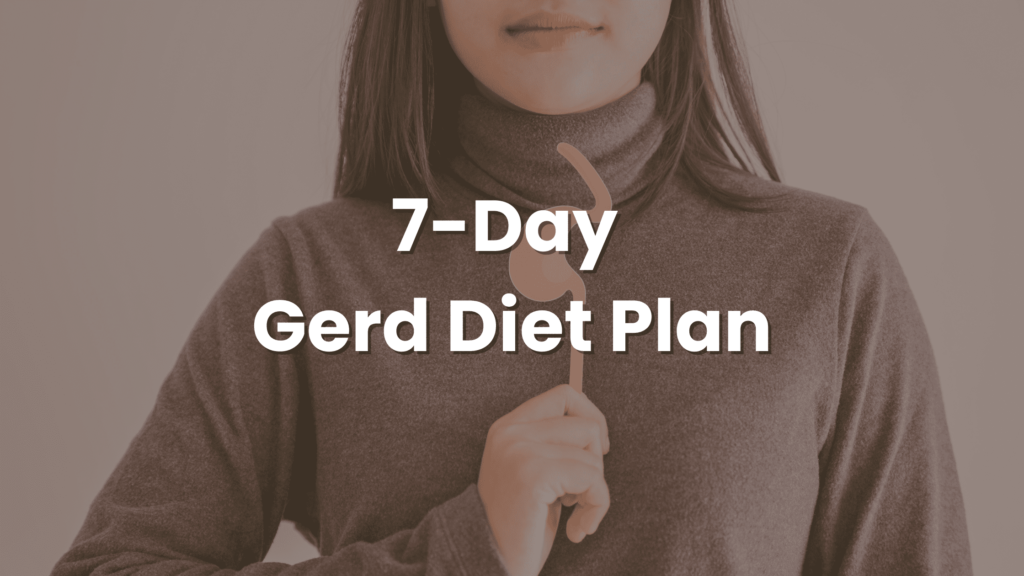Get effective relief with our comprehensive 7-day GERD diet plan. Free yourself from discomfort with expert tips and meal ideas tailored to manage GERD symptoms. Start your journey to better digestion today!
Approximately 20% of the population in the United States suffers from Gastroesophageal Reflux Disease (GERD). This chronic condition not only causes discomfort and pain but also significantly impacts daily life, affecting work, sleep, and overall well-being. Managing GERD through a well-planned diet can be a game-changer, providing relief and enhancing quality of life.
Table of Contents
What is GERD?
Gastroesophageal Reflux Disease (GERD) is a chronic digestive disorder where stomach acid irritates the food pipeline. This occurs when the lower esophageal sphincter (LES) becomes weak or relaxes when it shouldn’t, allowing stomach contents to flow back into the esophagus.

Common Symptoms
- Heartburn: A burning sensation in the chest, after eating, which can be very bad at night.
- Chest pain: Sometimes confused with the pain associated with heart disease.
- Difficulty swallowing (dysphagia).
- Chronic cough, laryngitis, or a sore throat.
- Sensation of a lump in the throat.
Common Triggers
- Certain foods and beverages: Spicy foods, onions, citrus products, tomato-based products, fatty or fried foods, chocolate, caffeine, alcohol, and carbonated beverages.
- Over-eating or lying down just right after a meal.
- Obesity.
- Pregnancy.
- Smoking.
- Certain medications, such as aspirin, ibuprofen, certain muscle relaxers, or blood pressure medications.
Food To Avoid In 7 Day Gerd Diet Plan

Managing GERD involves making careful dietary choices to prevent triggering symptoms. Here’s a rundown of foods and beverages to avoid:
1. Spicy Foods
- Examples: Hot peppers, chili powder, salsa, curry.
- Why to Avoid: Spicy foods can irritate the esophagus and exacerbate heartburn and other GERD symptoms.
2. Acidic Foods
- Examples: Citrus fruits (oranges, grapefruits, lemons), tomatoes, tomato-based products (sauces, soups), vinegar.
- Why to Avoid: Acidic foods can increase stomach acidity and lead to reflux, causing discomfort and irritation.
3. Fatty Foods
- Examples: Fried foods, fast food, fatty cuts of meat, full-fat dairy products, butter, margarine.
- Why to Avoid: High-fat foods slow down the stomach’s emptying process, which increases the likelihood of reflux. They also relax the LES, allowing stomach acid to escape into the esophagus.
Suggested: Download Your Weekly Meal Plan Template: Your Go To Meal Prep
4. Caffeine
- Examples: Coffee, tea, certain sodas, energy drinks, chocolate.
- Why to Avoid: Caffeine can relax the LES, allowing stomach acid to reflux into the esophagus.
5. Alcohol
- Examples: Beer, wine, liquor, cocktails.
- Why to Avoid: Alcohol can relax the LES and increase stomach acid production, both of which can contribute to reflux and heartburn.
Benefits Of A 7-Day GERD Diet Plan

1. Symptom Relief
- Explanation: Following a GERD-specific diet helps to minimize symptoms such as heartburn, regurgitation, and discomfort.
- Benefits: Reduces the frequency and severity of GERD episodes, providing immediate relief and improving overall quality of life.
2. Improved Digestive Health
- Explanation: A diet tailored to manage GERD emphasizes foods that are easy to digest and low in acidity.
- Benefits: Promotes better digestion, reduces inflammation of the esophagus, and helps maintain a healthy gut environment.
3. Weight Management
- Explanation: GERD-friendly foods are typically low in fat and calories, which can aid in weight loss or maintenance.
- Benefits: Managing weight can reduce pressure on the stomach, thereby decreasing the likelihood of acid reflux.
Related: Amazing 7 Day High Protein Vegetarian Diet Plan for Weight Loss
4. Nutritional Balance
- Explanation: A well-planned GERD diet includes a variety of nutrient-dense foods.
- Benefits: Ensures you receive essential vitamins and minerals, supporting overall health and well-being.
5. Reduced Dependence on Medication
- Explanation: Adhering to a GERD diet can lessen the need for medications that manage symptoms.
- Benefits: Reduces potential side effects and dependency on over-the-counter or prescription drugs.
6. Increased Energy Levels
- Explanation: Avoiding foods that cause discomfort and choosing those that support digestion can lead to more consistent energy levels.
- Benefits: Enhances daily functioning, productivity, and overall vitality.
7. Long-Term Health Benefits
- Explanation: Consistently following a GERD diet can help prevent complications such as esophagitis, Barrett’s esophagus, and esophageal cancer.
- Benefits: Promotes long-term digestive health and reduces the risk of serious health issues related to chronic GERD.
7-Day Gerd Diet Plan

Day 1
- Breakfast: Oatmeal with banana slices.
- Snack: Non-citrus fruit (e.g., apple slices).
- Lunch: Grilled chicken salad with a light vinaigrette.
- Snack: Carrot sticks with hummus.
- Dinner: Baked salmon with steamed broccoli and quinoa.
Day 2
- Breakfast: Greek yogurt with honey and blueberries.
- Snack: Rice cakes with almond butter.
- Lunch: Turkey and avocado wrap.
- Snack: Cucumber slices.
- Dinner: Stir-fried tofu with mixed vegetables and brown rice.
Day 3
- Breakfast: Smoothie with almond milk, spinach, and a handful of strawberries.
- Snack: Handful of almonds.
- Lunch: Quinoa salad with grilled vegetables.
- Snack: Celery sticks with peanut butter.
- Dinner: Baked chicken breast with sweet potatoes and green beans.
Day 4
- Breakfast: Scrambled eggs with spinach and whole grain toast.
- Snack: Non-citrus fruit (e.g., pear slices).
- Lunch: Lentil soup with a side salad.
- Snack: Low-fat cheese and whole grain crackers.
- Dinner: Grilled shrimp with asparagus and wild rice.
Day 5
- Breakfast: Whole grain toast with avocado and a poached egg.
- Snack: Yogurt with honey.
- Lunch: Chicken and vegetable soup.
- Snack: Bell pepper slices with hummus.
- Dinner: Baked cod with roasted Brussels sprouts and mashed potatoes.
Day 6
- Breakfast: Smoothie with coconut milk, kale, and a handful of raspberries.
- Snack: Mixed nuts.
- Lunch: Chickpea salad with cucumber and tomatoes.
- Snack: Apple slices with almond butter.
- Dinner: Turkey meatballs with zucchini noodles.
Day 7
- Breakfast: Oatmeal with diced apples and cinnamon.
- Snack: Greek yogurt with a handful of nuts.
- Lunch: Grilled chicken wrap with lettuce and tomato.
- Snack: Baby carrots with guacamole.
- Dinner: Vegetable stir-fry with tofu and brown rice.
Similar: The Powerful 14-Day Sugar Free Diet Plan for Rapid Weight Loss!
Tips For Success On The 7-Day GERD Diet Plan
1. Plan Your Meals in Advance
- Explanation: Take time to plan your meals and snacks for the entire week.
- Benefits: Ensures you have GERD-friendly foods on hand and reduces the temptation to eat trigger foods.
2. Keep a Food Diary
- Explanation: Track what you eat, when you eat, and any symptoms you experience.
- Benefits: Helps identify specific triggers and monitor your progress.
3. Eat Smaller, More Frequent Meals
- Explanation: Instead of three large meals, opt for five to six smaller meals throughout the day.
- Benefits: Prevents overfilling the stomach and reduces the risk of reflux.
4. Stay Hydrated
- Explanation: Drink plenty of water throughout the day, but avoid drinking large amounts during meals.
- Benefits: Aids digestion and prevents dehydration, which can exacerbate symptoms.
5. Avoid Eating Late at Night
- Explanation: Finish eating at least three hours before bedtime.
- Benefits: Allows time for digestion and reduces the likelihood of nighttime reflux.
6. Chew Food Thoroughly
- Explanation: Take your time to chew each bite slowly and thoroughly.
- Benefits: Aids in digestion and reduces the risk of overeating.
7. Incorporate Relaxation Techniques
- Explanation: Practice stress-reducing activities such as yoga, meditation, or deep breathing exercises.
- Benefits: Stress can worsen GERD symptoms, so managing stress can help improve digestion and overall health.
8. Wear Loose-Fitting Clothing
- Explanation: Avoid tight clothes that can put pressure on your stomach.
- Benefits: Reduces the risk of reflux and provides more comfort.
9. Elevate Your Head While Sleeping
- Explanation: Use a wedge pillow or elevate the head of your bed.
- Benefits: Helps prevent acid from flowing back into the esophagus while you sleep.
10. Stay Consistent and Patient
- Explanation: Stick to the plan even if you don’t see immediate results.
- Benefits: It may take time for your body to adjust, but consistency will lead to better symptom management and overall health improvements.
Do You Know?: The Truth Behind Anne Hathaway’s Weight Loss: Debunking Myths and Rumors
Epilogue
Managing GERD can be challenging, but with the right approach, it’s possible to significantly reduce symptoms and improve your quality of life. Our 7-day GERD diet plan provides a structured and effective way to identify and eliminate trigger foods, while introducing nutritious and delicious alternatives.
By following the tips for success and staying committed to the plan, you can take control of your health and enjoy your meals without discomfort. Remember, it’s not just about the foods you eat, but also how you eat them and manage your overall lifestyle. Stick with it, stay patient, and you’ll soon see the benefits of a GERD-friendly diet. Here’s to a happier, healthier you!
Additional Resources
- Related Articles on GERD and Diet:
- Recommendations for Further Reading on GERD Management:
- Dropping Acid: The Reflux Diet Cookbook & Cure by Jamie Koufman and Jordan Stern
- The Acid Watcher Diet: A 28-Day Reflux Prevention and Healing Program by Jonathan Aviv
- The Complete Acid Reflux Diet Plan: Easy Meal Plans & Recipes to Heal GERD and LPR by Nour Zibdeh
- Helpful Websites:








